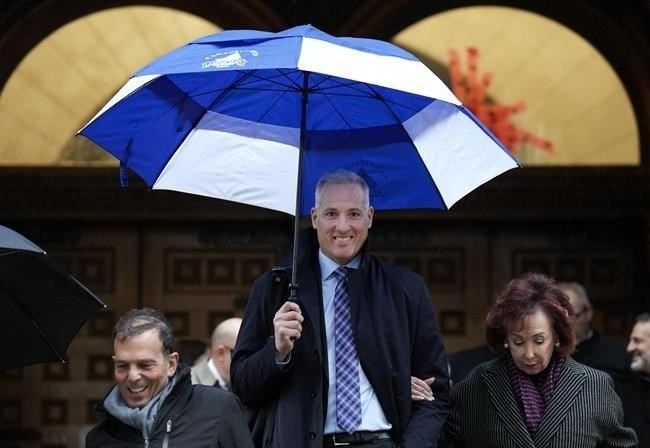Former CannTrust leaders acquitted in unlicensed growing trial

TORONTO - An Ontario court has acquitted three former cannabis leaders charged with offences linked to unlicensed growing at a Niagara area greenhouse.
The ex-CannTrust Holdings Inc. executives Peter Aceto, Eric Paul and Mark Litwin were freed of their charges a day after the Ontario Securities Commission (OSC) revealed it no longer had a reasonable prospect of convicting the men.
The acquittal marks a stunning reversal for the OSC, which had been pursuing its first court case involving a publicly traded cannabis company since it laid charges against the ex-CannTrust executives last year.
Following the acquittal, the OSC said it is "considering the implications of the decision and assessing its options" because CannTrust's disclosure of unlicensed growing in July 2019 caused "significant investor losses."
Industry observers were eagerly anticipating the outcome of the case because they felt a strong ruling in favour of the financial regulator would deter other pot companies from skirting the law.
The charges against former chief executive Aceto, board chairman Paul and vice-chairman Litwin centred on the Vaughan, Ont. company’s Pelham facility, where the OSC claimed cannabis was grown in unlicensed rooms in 2018 and 2019.
The OSC alleged the men used corporate disclosures to assert that they were compliant with regulations. They also accused Litwin and Aceto of signing off on prospectuses used to raise money in the U.S., which stated CannTrust was fully licensed and compliant with regulatory requirements, and said Litwin and Paul traded shares of CannTrust while in possession of material, undisclosed information regarding the unlicensed growing.
The men, who pleaded not guilty in October, were each charged with fraud and authorizing, permitting or acquiescing in the commission of an offence.
Litwin and Paul were also facing insider trading charges, and Litwin and Aceto were charged with making a false prospectus and false preliminary prospectus.
The accused, who attended court every day of the trial, remained stoic as their lawyers argued Thursday against the OSC’s request to have the case with withdrawn.
But when Justice Victor Giourgas issued the acquittal, family members, friends and counsel who have accompanied the accused exchanged grins.
“For over two years, Peter Aceto sat quietly while his earned reputation for honesty was under a cloud of wrongful allegations,” said Aceto’s lawyer, Frank Addario, following the hearing.
“It is not possible to understate the effect of a wrongful allegation against a citizen.”
Addario added that Aceto, who was once the president and chief executive of Tangerine Bank, suffered “great reputational harm” because his career trajectory was interrupted and the bank he previously worked for told him he was no longer a customer.
CannTrust fired Aceto in 2019, forced Paul to resign and Litwin later stepped down.
Asked whether Aceto will seek further reparations, Addario said, “Today is a day for celebrations, not for remedies.”
Gerald Chan echoed many of Addario’s sentiments saying his client Eric Paul was subject to the “crushing burden” of the case and “is happy he is fully and finally vindicated.”
Meanwhile, Scott Fenton and Michelle Psutka, Litwin’s lawyers, said in a written statement that their client “looks forward to vindicating his good reputation and erasing the stain caused by this ill-founded prosecution.”
Their trial got underway in the fall with a debate about the scope of the fraud charges the men were facing, but in recent weeks the OSC had begun calling witnesses, including Greg Guyatt, the current chief executive of CannTrust, now called Phoena Holdings Inc.
However, the OSC’s case didn’t start to crumble until early December, when Graham Lee, a former CannTrust director of quality and compliance, took the stand.
Lee told the court growing in unlicensed rooms was "very openly" discussed at the company, including in front of some of the accused executives, but began walking back some of his claims during cross-examination from Fenton.
Fenton’s cross-examination presented Lee with documentation showing the entire Niagara facility was licensed between 2017 and Sept 2019, first under the Access to Cannabis for Medical Purposes Regulations and then under the Cannabis Act, when cannabis was legalized.
Lee testified the licences he was shown did not include any restrictions on what rooms the company could grow pot in. The OSC said Lee was not shown the licenses in a pretrial interview it completed with him.
Fenton then showed Lee documents where CannTrust was seeking ministerial approval to add rooms where unlicensed growing was alleged to that licence.
Another exhibit showed a Health Canada policy change in May 2020, which relieved cannabis producers of the need to get ministerial approval before using growing rooms and noted it was never a legal requirement, Addario said.
Lee, who was given immunity to testify, also admitted he mistakenly used the words “licensed” and “unlicensed” to describe some of CannTrust’s growing rooms and said “at times” he was confused by the Cannabis Act.
The licenses and Lee’s testimony call into question action taken against CannTrust by Health Canada and a July 2019 news release from CannTrust, announcing Health Canada found the company non-compliant with regulations.
“Growing in unlicensed rooms took place from October 2018 to March 2019 during which time CannTrust had pending applications for these rooms with Health Canada,” the company said.
Phoena's chief commercial officer Jeffrey Zietlow told The Canadian Press in an email that "this decision has no bearing on Phoena’s business and we have no interest in these matters."
Health Canada maintains it made several "critical observations" during an unannounced inspection of CannTrust's facility in July 2019.
Among the observations were "conducting unauthorized activities, namely producing cannabis in unlicensed rooms before obtaining approval from Health Canada, providing false and misleading information to inspectors during the course of the inspection, and inadequate record keeping."
"At that time, producing cannabis in unlicensed rooms was considered non-compliant with the Cannabis Regulations because Health Canada’s approval was required before making changes to a production site plan," Health Canada spokesperson Tammy Jarbeau said in a Thursday email.
In September 2019, after halting cannabis sales and shipments from the company, Health Canada suspended CannTrust’s license.
It was delisted from the Toronto Stock Exchange in May and filed for creditor protection. It has since been working to stage a comeback and exited creditor protection in March, after receiving $17 million in financing from a subsidiary of Netherlands-based private equity investment firm Kenzoll B.V.
This report by The Canadian Press was first published Dec. 15, 2022.



